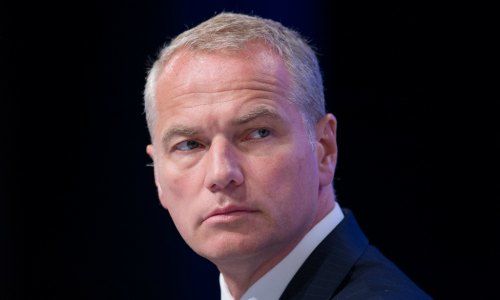Former UBS investment bank head Carsten Kengeter has been having a bad day – for the last nine months. With Deutsche Boerse's merger with the London Stock Exchange dead and buried, he faces several threats to his professional future.
When Carsten Kengeter left UBS in 2013, then 45, the investment banker’s next stop was the subject of much speculation. Independently wealthy, he told associates that he could imagine starting a hedge fund.
In fact, the Heilbronn-born banker kept a low profile after leaving UBS, lecturing at the London School of Economics, his alma mater, and reportedly absolving the Patrouille des Glaciers, a Swiss-army organized ski-mountaineering ultra-race from Zermatt to Verbier. He also quietly invested in fintech firms – until the news broke two and a half years ago that he would run Deutsche Boerse when Reto Francioni retired.
The appointment was a coup for the stock exchange, but Kengeter’s tenure in Frankfurt has been luckless. Now, signs are mounting that his time at Deutsche Boerse may be coming to an end. finews.com summarizes the four most important reasons.
1. Insider trading
By far the biggest of Kengeter’s worries: German authorities have searched his office and home as they look into a leveraged executive pay scheme set up exclusively for him. The plan could see Kengeter take home nearly 34 million euros over three years on top of his regular salary and bonus, if he meets profit and share price targets. Kengeter had to buy shares on his own dime at the same time as the plan was set up, and German officials want to know whether Deutsche Boerse had already begun hatching merger plans with the London Stock Exchange, LSE, when he did.
Those who have worked with him at UBS say it is inconceivable that Kengeter attempted to trade on inside information. He hasn’t been charged with anything and still enjoys the unanimous backing of his board. Deutsche Boerse's supervisory board is equally culpable of approving a scheme requiring its CEO to buy shares when the exchange was almost certainly already in touch with its U.K. counterpart about a historic merger.
Regardless of outcome, the matter raises questions of propriety and judgement at Deutsche Boerse – something Germany’s public stock utility can ill-afford (see «Contract Renewal» below).
2. Forex Fail
In his second month on the job in 2015, Kengeter and Deutsche Boerse outbid other suitors for 360T, splashing out 725 million euros for the online foreign exchange trading platform. Along with Eurex and other initiatives, Kengeter is counting on 360T to warrant its purchase price by helping the exchange get to double-digit earnings growth from next year. Last month, Deutsche Boerse said 360T’s average daily volume grew a mere 4 percent last year.
Whether 2016 represents a momentary lull or 360T gussied itself up look far more attractive to suitors than it is – early signs are the purchase is hardly a resounding endorsement of Kengeter’s dealmaking acumen.
3. LSE Collapse
On Wednesday, Brussels put the nail in the coffin of Kengeter’s dream to run a London-based pan-european alliance of exchanges – the same day as Britain formally launched proceedings to leave the EU. LSE shareholders had overwhelmingly backed the £24 billion deal, unlike the last Deutsche Boerse foray into London under the often-belligerent Werner Seifert 13 years ago.
The problem? Brexit happened. Kengeter and Xavier Rolet, his London counterpart, struck the deal before Britain voted to leave the EU. In the end, Brussels will go on record as killing the merger, but it died long before as Deutsche Boerse, the LSE, and German state Hesse fought over revisiting the deal terms to adapt to the reality of Brexit.
4. Contract Renewal
Thus back to the pencil-pushing world of German corporate life it is, where Kengeter’s contract is set to expire in April of next year. Typically this would mean the CEO and his supervisory board begin negotiating in the coming summer months, and with the LSE merger off, Kengeter certainly has the time to devote to talks.
Why won’t they happen? The insider trading probe throws a massive spanner in the works: Deutsche Boerse can hardly invite Kengeter to begin discussing his future until it is apparent that prosecutors won’t levy insider trading charges.
If Kengeter does face charges, Deutsche Boerse would have to suspend the CEO, who has said that insider trading violates his «innermost conviction», pending trial. While those close to Kengeter assume he would like to stay at Deutsche Boerse, this may change if he is put in the dock in Germany.
Only one of these – the insider trading probe – is a potential knockout blow for Kengeter, who is also grappling with lackluster operating results.
To be sure, Kengeter is no shrinking violet: and he survived five tumultuous years at UBS: he withstood the $2 billion rogue trading loss incurred by Kweku Adoboli, a scandal which led to the departure of his boss at the time, Oswald Gruebel.
He was also unscathed an ill-advised decision to ramp up fixed income again following the bailout, as well as several rigging scandals in the investment bank, including Libor and precious metals. Whether the former UBS top executive survives the latest storm remains to be seen.



































